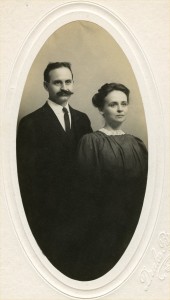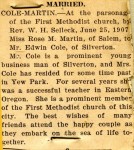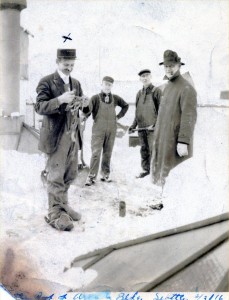Something New in the 1940 Census
Now that the 1940 census is more or less fully indexed I took a lazy woman’s stroll through some of our ancestor’s records. I wasn’t expecting much new information. My mother and mother-in-law both remembered that time and filled me in on the stories of our grandparents. With such low expectations I was all but assured of finding something of interest and, of course, I did.
My husband’s grandfather worked for the WPA in 1940. The WPA or Works Project Administration was founded in 1935 by the order of President Roosevelt to alleviate unemployment and start the country on the road to recovery from the Great Depression. At it’s peak in 1938 it provided jobs for 3,000, 000 people. Edwin Cole was one of them.
Administration was founded in 1935 by the order of President Roosevelt to alleviate unemployment and start the country on the road to recovery from the Great Depression. At it’s peak in 1938 it provided jobs for 3,000, 000 people. Edwin Cole was one of them.
In the 1940 census Edwin reports that he is working in “cement” and employed by the WPA. My husband remembers being told that his grandfather traveled around Seattle pouring cement porches for people with an African-American partner. Such a partnership would be unusual in the 30’s and 40’s, but maybe not if the WPA was involved. The NAACP praised the WPA for providing African-Americans with real opportunity. I would love to know if this partnership started with the WPA and continued on afterward. There is so much rich history to be discovered in WPA records, but I haven’t scratched that surface yet.
Today, I am simply wondering what brought Edwin Cole to need the help of the WPA.
 Edwin emigrated from Northern Ireland as an infant and lived with his parents in Nebraska and then Oregon. In Oregon he met Rosa May Martin and married her in 1907. The marriage announcement states that Ed is “a prominent young businessman”.. By 1908 they were settled in Seattle. A daughter was born and died in that year. The 1909 city directory shows Edwin owning a grocery store at 2422 2nd Av. Edwin and Rosa were living above the store.
Edwin emigrated from Northern Ireland as an infant and lived with his parents in Nebraska and then Oregon. In Oregon he met Rosa May Martin and married her in 1907. The marriage announcement states that Ed is “a prominent young businessman”.. By 1908 they were settled in Seattle. A daughter was born and died in that year. The 1909 city directory shows Edwin owning a grocery store at 2422 2nd Av. Edwin and Rosa were living above the store.
The next city directory entry I can find is 1914. By then Edwin and Rosa are living at 927 N. 87th St.. They owned that house and would live there for many years. The grocery store is gone and through the years that followed until1929 Edwin worked at various jobs in a shipyard. I expect there was work to be had in the shipyards prior to and during the First World War and Edwin seems to have found steady employment there. By 1920 two sons had joined the family in the house on N 87th street.

After the stock market crash in 1929 America’s industries, including ship building, ground to a halt. In the 1930 census Edwin is listed as a houseman in a hotel. A houseman is a janitor in a hotel. I imagine Ed lost his job and counted himself lucky to be working as a janitor in 1930. Although things must have been difficult Ed and Rosa were still able to deed two wood lots to their sons in 1934.
By 1935 things got worse. Ed was unemployed and then in June Rosa died. Ed couldn’t find full employment until the WPA provided a job for him. I’m not sure when he started working for the WPA, only that he continued at least until 1940. In 1938 he married Effie Kane and the two moved to a small house on Interlake Av. next door to Effie’s son. Ed made a total of $700 in 1939. These were hard years in America and in the Cole household. As America geared up for the Second World War the economy recovered and the austerity of the 30s eased.
I think Ed and Effie had a few good years until Effie’s death in 1945. Ed continued for as long as he could and eventually moved in with my mother-in law and father-in-law. He died in 1959.
As for me, I seem to need to continually relearn the classic genealogy lesson, just when you think you’ve got it all figured out…

Thanks for your comment Joan. I think those who lived through the Depression were changed by it forever.
When the Depression of 29-34 or more, hit both sets of my grandparents were in their 50s. There work history and training was for the previous century, so no skills for the burgeoning industrialization, and that gas guzzling beast — the infernal internal combustion machine. They fell thru the cracks and never ever recovered. You did a great job of portrayng that time.